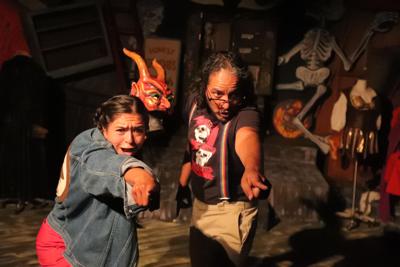It’s a tense time to be of Mexican descent in America. Powerful politicians spread negative stereotypes, immigration raids break families apart and institutions celebrating Chicano culture are under attack.
It sounds similar to today, with President Donald Trump’s pledge to end the Deferred Action for Childhood Arrivals (DACA) program, increasing deportations of undocumented immigrants and building a fortress-like wall on the Mexican border. But it’s the not-so-distant future, 2028 America, where Viva la Causa starts its narrative.
El Teatro Campesino’s original production, now in its second year running, takes audiences on a literal journey from stage to stage of their San Juan Bautista playhouse. Each stage and its respective play revolves around one chapter of Chicano history or its dystopian future.
Interactive elements of the play start right away. After picking up tickets at the box office, patrons are handed yellow or red paddles with pictures of items like Abuelita hot chocolate mix and pan dulce taped to them. Ushers lead audience members into the playhouse and split them into two groups according to paddle color.
A slideshow, projected on curtains, displays images of UFW co-founder Cesar Chavez giving speeches to Donald Trump at a presidential campaign rally. The slideshow ends with an alert and a picture of Honest Sanchita, a fugitive charged with the crime of keeping Chicano culture alive.
The curtains come down and reveal Sanchita, the protagonist, standing at the center of the room.
She informs the audience that among other recent disasters faced by the Chicano community, the El Teatro Campesino playhouse was raided by ICE and prohibited from producing their trademark plays highlighting Mexican-American history. In an effort to revitalize the defunct theater company, Sanchita intends to auction off everything in the playhouse to audience members raising their paddles and yelling bids.
Each room’s play ends with an auction of a Teatro artifact, like a mask from one of their beloved Christmas plays La Pastorela, and a fedora from the pachuco period piece Zoot Suit.
One room uses a corrido, or Mexican ballad—played by a live band—to tell a story. The music ranges from lively and comedic to mellow and moody while telling the story of a Mexican migrant stuck in a cycle of low-wage jobs to support his family.
This character’s story is most reminiscent of El Teatro’s roots of portraying a collective Chicano struggle to support the efforts of the United Farm Workers. The play’s hero must contemplate between continuing to pick fruit to feed his family or risking a wage by joining a strike. Unsurprising considering El Teatro’s long relationship with the UFW—founder Luis Valdez began the group as the cultural arm of the union—the character finds strength in solidarity with fellow workers fighting for fair conditions.
Another play moves even further back along El Teatro’s timeline, to when the theater company had more puppets than actors. The puppet show “Juanito y Los ABC’s” follows Juanito, a Mexican boy who is discouraged by teachers from embracing his heritage. Banned from speaking Spanish and shedding his name for the Americanized “Johnny,” he loses his identity and seeks help from a bruja (witch doctor).
“Que salgas bueno, que no salgas malo. Que no salgas gringo, que seas Chicano,” says the bruja while stirring potion and urging the audience to chant along.
The puppet show has a heavy dose of humor—a respite before a darker final act, again set in the future.
Sanchita returns and is in deeper trouble than ever. In this future America where even referencing Chicano culture is a crime, even Chicanos themselves turn their backs on the cause.
The year’s production of Viva La Causa makes more direct allusions to the political climate than last year’s debut, which ran before President Trump was elected.
Christy Sandoval, co director and producer, feels the dystopian tone is even more appropriate this time around.
“We knew the revisions to this year’s production had to raise the stakes because of the now-not-so far fetched reality we had presented,” Sandoval says.
In addition to making the tone this year run slightly grimmer and modifying some story arcs, Viva La Causa itself represents a major move forward for the half-century-old El Teatro Campesino; the concept of transitioning from stage to stage is something the theater company has never done before.
In other ways, the plays continues in El Teatro tradition, consistent with its mission from the start.
“We prompt our audience to shout things out throughout the show in order for them to feel part of this reality,” Sandoval says. “Raising social consciousness by creating theater by and for the people is still one of Teatro’s main pushes.”
Viva La Causa closes Sept. 24. Remaining shows run 8pm Thu and Fri, 2pm and 8pm Sat, and 2pm Sun. Sept. 21-24 at El Teatro Campesino, 705 4th St, San Juan Bautista. $15-$20. 623-2444, elteatrocampesino.com.


(0) comments
Welcome to the discussion.
Log In
Keep it Clean. Please avoid obscene, vulgar, lewd, racist or sexually-oriented language.
PLEASE TURN OFF YOUR CAPS LOCK.
Don't Threaten. Threats of harming another person will not be tolerated.
Be Truthful. Don't knowingly lie about anyone or anything.
Be Nice. No racism, sexism or any sort of -ism that is degrading to another person.
Be Proactive. Use the 'Report' link on each comment to let us know of abusive posts.
Share with Us. We'd love to hear eyewitness accounts, the history behind an article.